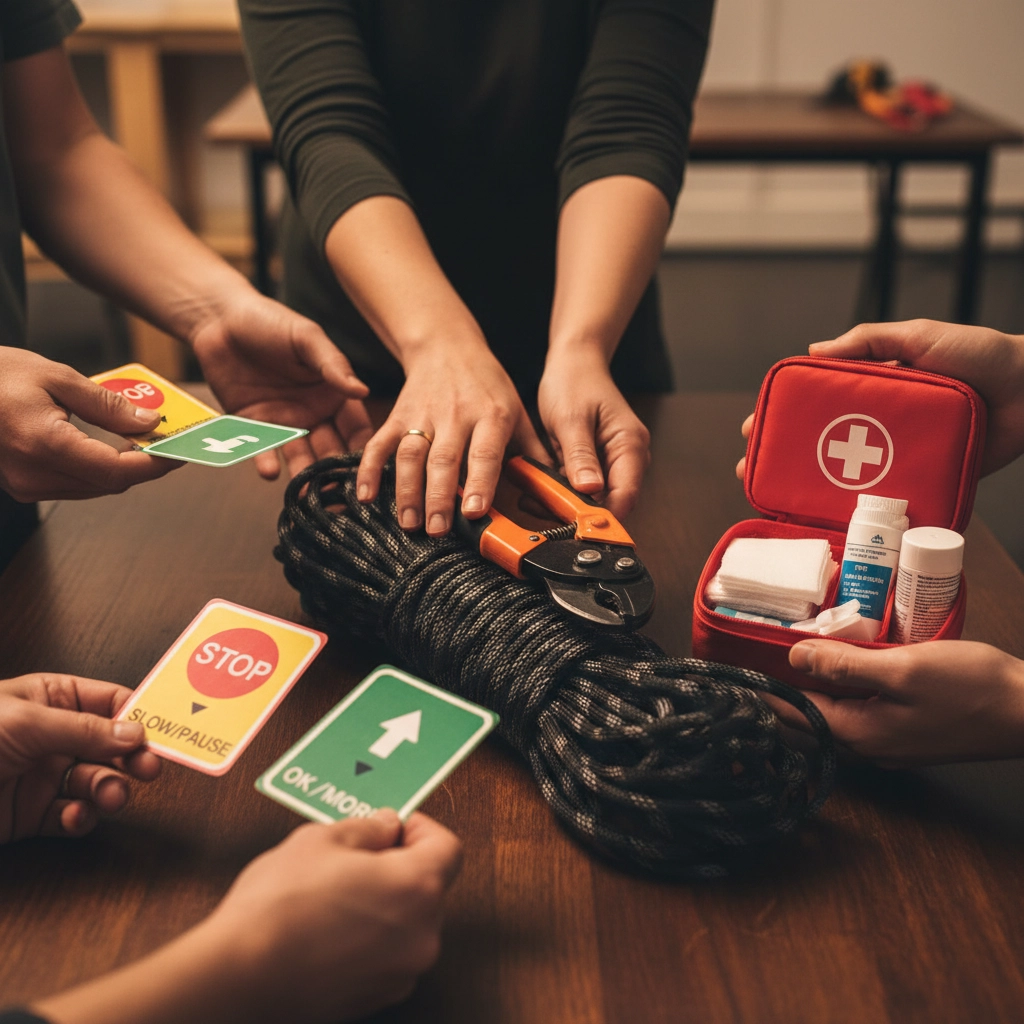The Real Deal on Online BDSM Training, From Lazy Ropes to Hardcore Classes
- Amanda Sandström Beijer
- Nov 6, 2025
- 6 min read

Look, I'm not gonna sugarcoat this. Three months ago, I was sitting in my Berlin apartment at 2 AM, watching some dude on my laptop explain single-column ties like he was teaching me to fold fucking fitted sheets. The course cost me €89 and promised "comprehensive rope mastery in six weeks."
Spoiler alert: I couldn't even tie my own shoes properly after that disaster.
But here's the thing, that shitty experience led me down a rabbit hole of online BDSM training that completely changed how I think about kink education. And after interviewing everyone from dungeon veterans to fresh-faced newbies stumbling through their first online workshops, I've got some hard truths to share about what's actually worth your time (and money) in the digital kink classroom.
The Spectrum: From Netflix-and-Chill to Navy SEAL Intensity
Online BDSM training isn't just one thing. It's like comparing a lazy Sunday morning rope tutorial on YouTube to a 12-week intensive program that makes you submit weekly reflection essays about your power exchange dynamics. Yeah, those both exist.
At the "lazy" end, you've got your basic technique videos, usually shot in someone's bedroom with questionable lighting, focusing purely on "put rope here, tie knot there." These run anywhere from free (thanks, PornHub University) to about €20 for a "comprehensive" package that's anything but.
Then there's the middle ground: structured courses that actually teach you shit. We're talking €50-150 for programs that cover consent protocols, risk awareness, scene negotiation, and yes, actual technique that won't land someone in the ER. These usually include private forums, Q&A sessions, and sometimes even one-on-one feedback.
At the hardcore end? Full mentorship programs running €300+ that treat kink education like the serious psychological and physical practice it is. Think university-level coursework with reading lists, practical assignments, and instructors who've been in the scene longer than you've been alive.

What You're Actually Learning (Hint: It's Not Just Rope Tricks)
Here's what blew my mind: the best online BDSM courses spend maybe 30% of their time on actual physical techniques. The other 70%? Pure psychology, communication, and safety protocols.
Take Sarah, a 28-year-old graphic designer I met at a Berlin dungeon who'd done six months of online training before stepping foot in a physical space: "I thought I was signing up to learn impact play techniques. Instead, I spent weeks learning how to read body language, recognize trauma responses, and have conversations about boundaries that didn't make me want to crawl under a rock."
Quality programs teach you to negotiate scenes like a diplomatic summit, recognize when someone's saying yes but meaning no, and handle the emotional tsunami that can hit after intense play. They cover practical shit like which medications make certain activities dangerous, how to spot nerve damage from rope work, and why that "edgy" instructor who mocks people's limits is actually a walking red flag.
The technical stuff comes later, and it comes with context. Instead of just showing you how to tie a chest harness, instructors explain why different body types require different approaches, how to adapt techniques for disabilities or injuries, and what the fuck to do when something goes wrong.
Check out Shibari Academy’s free Shibari lessons for example to get a free class on quality rope bondage.
Red Flags That Scream "Run, Don't Walk"
hree weeks into my online training journey, I stumbled into a course that made my skin crawl. The instructor spent the first ten minutes making jokes about "snowflake safewords" and dismissing anyone who needed "excessive" safety precautions. I noped out of there faster than tourists flee Berghain's door policy.
Massive red flags include:
Instructors who downplay risks or mock safety protocols
Anyone who can't provide clear credentials or community references
Courses that jump straight to advanced techniques without covering basics
Programs that don't address consent, boundaries, or aftercare
Instructors who shame questions or make students feel stupid
Anyone promising to "fix" your relationship through kink
Green flags that signal quality:
Transparent instructor bios with actual scene experience
Community endorsements (check FetLife, ask around Berlin's scene)
Emphasis on consent-forward language and opt-out options
Trauma-informed approaches that acknowledge different backgrounds
Adaptable content for various bodies, identities, and experience levels
Clear emergency protocols and safety information

Berlin Confessions: Why Online Training Matters Here Too
You'd think living in Berlin, kink capital of fucking Europe, would make online training irrelevant. Wrong. Even in a city where you can stumble into a rope workshop every Tuesday night, digital education fills crucial gaps.
Marcus, who runs workshops at one of Berlin's most respected dungeons, put it perfectly: "Online courses give people vocabulary and baseline knowledge before they walk into physical spaces. I'd rather teach advanced techniques to someone who understands consent protocols than spend three hours explaining why we use safewords."
Plus, let's be real, Berlin's scene can be intimidating as hell. Walking into your first dungeon event when you don't know a single knot from a safety release can feel like showing up to Berghain in khaki shorts. Online training gives you enough foundation to not look like a complete tourist.
I've seen seasoned players use online courses to explore interests they're not ready to discuss in person yet. Age play, financial domination, more extreme impact work, sometimes you need private space to figure out what actually turns you on versus what you think should turn you on.
The Newbie Survival Guide (Shit I Wish Someone Had Told Me)
Start with communication and consent courses, not technique.
I cannot stress this enough. The sexiest rope work in the world means nothing if you can't negotiate a scene without breaking out in hives.
Budget for multiple courses, not one "comprehensive" package.
Different instructors offer different perspectives, and you need multiple viewpoints to develop your own approach.
Join the community forums, even if you feel awkward.
Half the value comes from discussions with other students. Yes, some people are pretentious assholes who've been doing "ethical kink" since before you were born, but others ask the same stupid questions you're too embarrassed to voice.
Practice on yourself first.
If you're learning rope work, tie those knots on your own wrists (carefully, obviously). If you're exploring impact play, feel what different sensations actually do before inflicting them on someone else.
Document your journey.
Keep notes about what works, what doesn't, and how you're developing your own style. This isn't just navel-gazing: it helps you articulate your interests and limits to future partners.

The Real Value: Beyond Perfect Technique
Here's what surprised me most about diving deep into online BDSM education: it's not really about becoming technically perfect. It's about developing confidence, self-awareness, and the ability to create experiences that are actually hot instead of just technically correct.
Lisa, a 35-year-old sub who completed a year-long online mentorship program, explained it best: "Before training, I knew what I didn't want but couldn't articulate what I actually craved. After working with mentors online, I developed language for my desires and learned to advocate for experiences that fed my specific needs rather than just going along with whatever dominants suggested."
The best programs teach you to become your own expert rather than just copying someone else's playbook. They help you develop personal ethics, recognize your own biases and triggers, and build a sustainable practice that evolves with your interests and relationships.
Plus, let's talk about the elephant in the room: online training is often safer for marginalized folks exploring kink. If you're a trans person, a person of color, or someone whose body doesn't fit conventional beauty standards, learning in private spaces can feel significantly safer than immediately jumping into physical communities where discrimination unfortunately still exists.
The Bottom Line (Pun Intended)
Online BDSM training isn't a replacement for in-person community and hands-on learning, but it's become an essential foundation. The digital landscape has democratized access to quality education and created opportunities for deeper, more thoughtful exploration of kink practices.
Just don't make my mistake and think you can become a rope god overnight with a €89 course taught by someone whose qualifications include "I've tied up my girlfriend a few times." Invest in quality instruction, prioritize safety and communication over flashy techniques, and remember that the hottest scenes come from understanding psychology and connection, not just knowing which knots look pretty.
Now if you'll excuse me, I have a proper suspension course to attend: one that actually covers nerve pathways and emergency protocols. Some of us learned our lessons the hard way.


